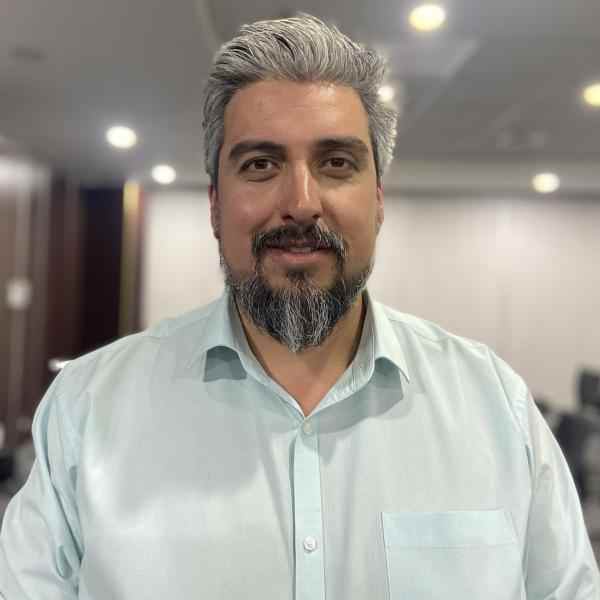Introduction
Tomás Lawrence is creating a new expansive data model that contextualizes and interprets public data around hate speech against key vulnerable groups. This rapid warning system helps civil rights organizations, government, media, and marginalized groups themselves coordinate and respond in real-time to counter these harmful narratives.
The New Idea
In Latin America, we are used to receiving seismic and tsunami alerts on our cellphones. But there is no such thing as an early-warning system for digital earthquakes – and hatespeech on social media can cause devastating havoc in societies. Whereas biased views on minorities diffuse quickly and broadly, those actors working against these phenomena usually lack resources and tend to work in silos. In today’s world, knowing the rules of the game, the business and governance of digital platforms, as well as the strategies used to manipulate public opinion online is essential for organizations and social movements, so that they can identify risks or opportunities for influence and intervene on time.
Tomás Lawrence is using technology as an empowering tool to facilitate the diffusion of timely, streamlined messages, hacking the power of social media for the progressive sector. His foundation, Interpreta, brings Big Data analysis tools normally used in the advertising industry, to the NGO world and the public sector. Tomás has developed a science-based, academically validated model that harnesses Big Data to provide more nuanced views on trending social issues, and simultaneously, enabling actors involved in the solutions of these issues to have free access to the findings. Tomás’ goal is to level the playing field, so that stakeholders can detect potential threats to democratic processes on time, coordinate their actions, change narratives, and objectify collective imaginaries around minorities. Interpreta focuses its work on trending social issues that affect historically discriminated groups, counteracting the impact of fake news on public opinion and raising the cost of hate speech and the omission of fact-based views.
Tomas’ efforts have been focused on refining the technological aspect of the model, and currently he is busy strengthening Interpreta’s strategic partnerships that are already showing remarkable results in the diffusion of the model, supporting like-minded organizations in Colombia, Ecuador, Peru, and Chile to identify and promote narratives concerned with the social issues they are currently working on.
The Problem
When Tomás started Interpreta, he identified several problems. First, and foremost, the distortion and/or lack of access to reliable data for decision-making by relevant stakeholders, i.e., for the proper exercise of democracy. For example, increasing migration streams imply that countries around the world must generate public policies capable of dealing with this global challenge of which today we only see the tip of the iceberg, as it is caused by growing internal or external problems such as drought causing famine, natural disasters, wars, etc. And for this, policymakers need not only reliable information, but above all social acceptance to carry out their programs, which implies changing the narratives and news published on social networks and especially in publications/comments made by people in positions of power. Although there are numerous projects and initiatives that are addressing the arrival of migrants and refugees, in order to trigger successful lines of work capable of generating changes in legislation, integration projects and/or new narratives, you need an informed population and coordinated communication.
One example is discrimination against immigrants and refugees, whose scarce social integration causes a spiral effect that generates further segregation against them and continuously provokes acts of discrimination. Because of the widespread diffusion of hate speech over positive and more objective views, there are predominant beliefs about segments of the population that mislead public opinion. Moreover, in Latin America, the processes of discrimination against minorities go back a long time and are even harder to eradicate, generating a huge debt with Indigenous peoples, sexual and other minorities, dissidents, women in politics and climate activists.
Another major issue is the absence of a strong, unified humanistic message by the progressive sector on social media versus a predominance of hatespeech. Nowadays it is incredibly easy to spread credible fake news and destroy an idea or a person on social networks in a matter of seconds. Algorithms multiply sensationalist statements and minimize good news. Whereas conservatives and populists are true masters of simplified mass communication, the progressive sector tends to atomize its messages and focus on details instead of the big picture.
Tomás also observed a major difference of resources between NGOs/government and private companies: social organizations often lack resources such as qualified personnel and state-of-the-art technology to pursue their objectives for the common good because they tend to reinvest their income in direct service rather than in tools for strategic planning. They pay lower salaries and have less access to financing than traditional companies. And although governments have made huge efforts around digitalization, most would hesitate to assign funding for media consultants and publicity campaigns for fear of what it might look like in their budgets. But in today’s world, to succeed they must counteract the hatespeech related to the social problems they work with.
The Strategy
Knowing the market, anticipating the moves of competitors and gaining new customers is something that Tomás had learned in his previous life as an employee. So, when he started questioning himself on how to put these techniques to best use for the greater common good, his initial move was to change migrants' lives by delivering trustworthy data through apps. Since then, his strategy has evolved into providing multipliers, those who change lives, with tailor-made information analysis on hatespeech against vulnerable groups. He has become a true interpreter, honoring the name of his foundation.
Today, Interpreta combines traditional Big Data analysis (received for free, thanks to an alliance with Brandwatch, a major provider of publicity agencies) with its own elaborated research tools around social problems to create reliable data. Each step of the process has been validated by academic research. Tomás can analyze millions of publications in the shortest time, managing, for example, huge amounts of data on what people say about migrants through their tool able to analyze 200,000 public social media accounts and 100 digital media.
The core process consists of elaborating, together with his specialized team and according to the partners’ needs, complex mindmaps around social issues so that the digital search tools can cover each and every aspect of a subject. Tomás says, “It’s easy to promote a new pair of sneakers, but extremely difficult to sell something as abstract as the contribution of migrants to society, or the fact that sooner or later, the climate crisis might turn any of us into a migrant”. For example, in the case of Haitian migrants in Chile, the team would link expressions like ‘foreigner’, ‘migrant’, and a whole series of words, to then get in-person and virtually into forums to track how and where people talk about this issue and feed the algorithm with this.
Once the results are transformed into graphics, one can see what percentage of the xenophobic messages are generated by which number of accounts. And if these (usually very few) accounts are reported to the providers, they can eventually even be closed. Tomás then “packs” the data according to the paying allies’ needs assure broad diffusion among strategic multiplicators. He enables his allies who are bundling their impact through public policy advocacy and empowering civil society organizations. “Interpreta is only the thermometer, but it’s doctors who have to prescribe the medication”, is one of his standard phrases.
Since the results are segmented and sent in a way to which stakeholders are used, Tomás effectively employs third parties and specialized media to amplify his scope each year. In 2022 alone, there were 32 publications between alerts, policy briefs and narrative reports. Today, the information that Interpreta generates reaches a database of 440 key people: 47 international NGOs, 48 Chilean NGOs, 35 governments, 22 academia, 142 media outlets and 146 individual stakeholders such as activists, lawyers, among others. The list of target audiences includes border agencies, mayors with whom Interpreta organizes intersectional roundtables, universities such as Barcelona and the World Bank in Peru, GIZ (German Agency for International Cooperation) in Ecuador who act as funders and multipliers of their monthly segmented newsletters and media releases.
An example for segmentation: Tomás observed the dynamics of the public sector and decided to create solid, long, detailed PDFs to cater to more traditional decision-takers. Interpreta caters to their different targets in different ways, being the most used by the public sector a detailed analysis of trends sent as an email-attachment every couple of months, called “Barómetro”. These results of their findings on areas like Xenophobia/Migration, Female Leadership in electoral processes and Indigenous Population are widely used for prevention and course correction by politicians, academia, and influencers mainly in four countries (Chile, Peru, Colombia and Ecuador), which significantly decreases the tendency to radical voting, resulting in stronger inclusive and intercultural communities and less polarization.
Internationalization is a priority today, and Tomás tries to be present at international seminars for social change (R4V, Hola América, Foro Salud Migrante, OIM). He trains teams in other countries on how to make best use of the model, because if all these like-minded organizations received one single, unified message at the same time, validated by academia and made graspable (e.g., in a simple word cloud), the likelihood of coordinated action increases exponentially. Tomás believes in this grassroots system, he is strictly against creating their own bots, because it would mean playing by the rules of the bad guys. His approach is all about equity, leveling the ground for massive, coordinated action.
Interpreta’s economic sustainability model is to keep staff costs to a minimum (Tomás, the director of migration and a part-time accountant) and hire experts on a project-by-project basis. By including merely the results in their contracts, not the data itself, all the information they generate for paying allies is available for free to any civil society of government organization interested. Interpreta’s reputation today allows for selecting important partners like IOM (International Organization for Migration), ONU Women, Save The Children among others, and receiving financing from foundations like Ford, Otraparte, Hilton etc., which means that Tomás can pay his highly specialized team the fees they would also charge for commercial agencies. He pulls economic resources from large NGOs and provides info for free to small grassroots non-profits. Since his backbone is the free Brandwatch-license, he can offer a good price for tailor-made products, and his model is sustainable. In this way, he is pushing forward the desired narratives by spreading a unified body of data, ensuring the quality of that delivered data on social issues also to smaller non-profits.
A major issue today is the distortion and/or lack of access to reliable data for decision-making by relevant stakeholders, i.e., for the proper exercise of democracy. Since 2017 Interpreta has used social intelligence (Big Data) available to the public on the internet, to better understand and direct public policies in areas such as labor, health, housing, education, women, security, integration, and discrimination/xenophobia. They focus the action on each of these micro-spaces of conversation to generate new narrative spaces and new campaign ideas. For example, according to the Latinobarómetro 2023 report, less than half of Latin Americans support democracy as a political regime: a decrease of 15 percentage points since 2010, when it reached 63%. So, when Tomás democratizes the access to trustworthy data, he contributes to the success of democratic processes. The conversation around these social issues becomes more balanced, so that citizens can make decisions based on facts, not on hatespeech. He helps the social sector to be stronger, more united, and make more informed decisions based on verified qualitative multiplicators: A good example is “La Lupa Digital”, a Central American/Mexican digital platform that sends alerts about threats affecting the digital civic space in the region. So, when false news spread in Colombia that abortion was not a right and hence not paid by the State, Interpreta generated an alert, Lupa Digital corrected the message (“Yes, abortion is a right and keeps being free”) and quickly got it to its network.
Another line of work is to help unmasking bots and diffusors of hatespeech: Tomás employed his methodology to detect antisemitic messages and empowered senior citizens of the Jewish community in Santiago to denounce hatespeech with the administrators of social media tools asking for closure of those accounts. The seniors today travel across Latin America to teach this to their peers in senior groups at synagogues all over South America.
His desire is to open new fields and search for adequate partners within his network of international allies. This is already happening with the subject of hatespeech (and/or omission, its counterpart: silencing an issue can be as harmful as badmouthing it!) around environmental activists and climate migration at LatAm regional level.
Tomás can apply his social research model to any topic. His scaling strategy is restricted to the Spanish-speaking countries for now, but he is present in the most important networks on digital democratization like Quid, Socialtic and “Red de Investigadores Digitales” formed by Fundación Puentes, Linterna Verde, two Brazilian universities, Kommons Barcelona and ProVox Venezuela. His mid-term goal is to promote a network of organizations that connect and feed from the reports generated by Interpreta, and to play a leading role when it comes to generating behavioral standards associated with digital spaces, which affect face-to-face spaces.
The Person
Tomás grew up in an environment where solidarity was a fundamental value. He studied in a Catholic school, was an acolyte and collaborated with different social projects within the church. The origin of his family has a migratory background. In his father's family there were mayors, as well as founders of social sports clubs and fire companies, whereas in his mother's family, many chose to be teachers. Hence, Tomás imaginary was always close to the possibility of making this a better world.
Tomás studied Public Administration at a private university with a strong social focus, where he also recently graduated in documentary filmmaking. He has additional studies in international migration, global policies, and social inequalities (CLACSO, Migrared) and Fundamentals of Prevention of Mass Atrocities, Rights of Indigenous Peoples in Latin America (both Auschwitz Institute for the Prevention of Genocide and Mass Atrocities), Human Rights (National Directorate of Human Rights Training, Secretariat of Human Rights, Argentina).
His father died suddenly when Tomás was an 18-year-old political science student, and his mother fell into a deep depression. Tomás then had to work, saving money everywhere so he could go back to college and realize his dream of becoming a documentary filmmaker. He started doing odd jobs and soon made a career in an international company. But then, instead of going into filmmaking, Tomás started working in public administration, linked to his other original interest, politics. After working on administrative reforms for international universities, he became a tutor for Public Administration, Political Science and Technology applied to Administration, as well as for the course "Learning in the Information Society".
However, once married and when his first child was born, he wondered what kind of world he was going to leave for his children and decided to quit, pretty much the opposite to the nesting instinct that prevails in most parents.
In 2016, Tomás co-founded Interpreta SpA with his partner Ignacio Loyola, which offered internal communication and marketing products to large companies, allocating 10% of profits to social projects and volunteering for important social initiatives such as Hogar de Cristo, Acción Solidaria, Paréntesis, Proyecto Propio, Doble Impacto, Línea Libre, among others. Wanting to go further, Tomás stepped down and founded Fundación Interpreta in 2017, because he realized that the lack of adequate engineering tools makes social organizations less efficient than companies. A fierce opponent of welfarism, he decided to act to empower the "beneficiaries", the first step being the creation of reliable data frameworks on which support organizations could base their planning. And the beneficiaries, their lives.
He considers the foundation as another son and even had to live off his wife's salary during 2019. Only after the pandemic did he manage to raise enough funds to pay off the debt generated by hiring 11 people pre-crisis who had to be laid off when Covid-19 hit.
His favorite subject was migrants, since, during his adolescence, one of his cousins had to go into exile and ended up in Central America as a migrant without networks, without family and without friends. Tomas was deeply marked by that story, as well as that of his own migrant family tradition, which led him to create Interpreta. Since 2018, he has dedicated 100% of his time to the foundation, of which he became its Executive Director in 2019. His goal is to generate the synergies necessary for the project to continue to grow.
Tomás, who has been learning all his life, is also a filmmaker. He has been through all sorts of hardships since he decided to quit his job to internationalize the Interpreta method, but many of his ancestors were firefighters, and we can think of no better allegory for someone whose goal in life is to extinguish the flames of hate speech.




